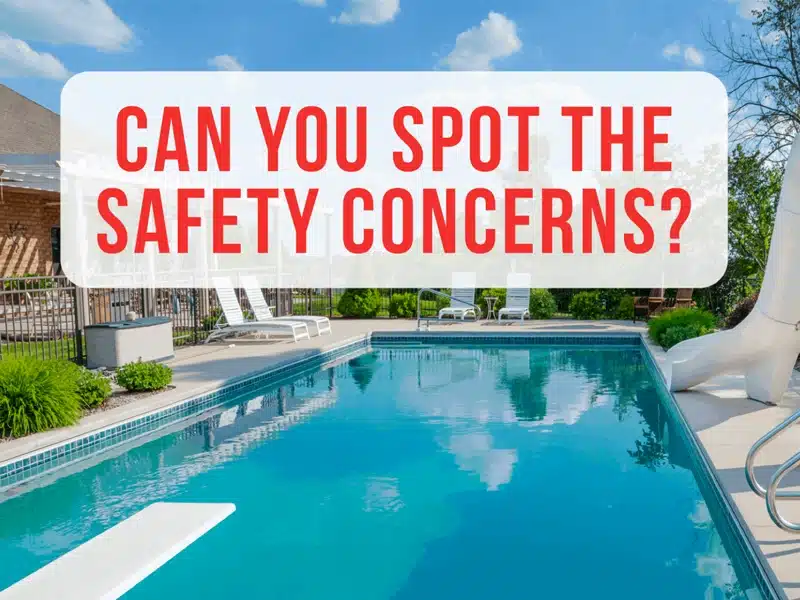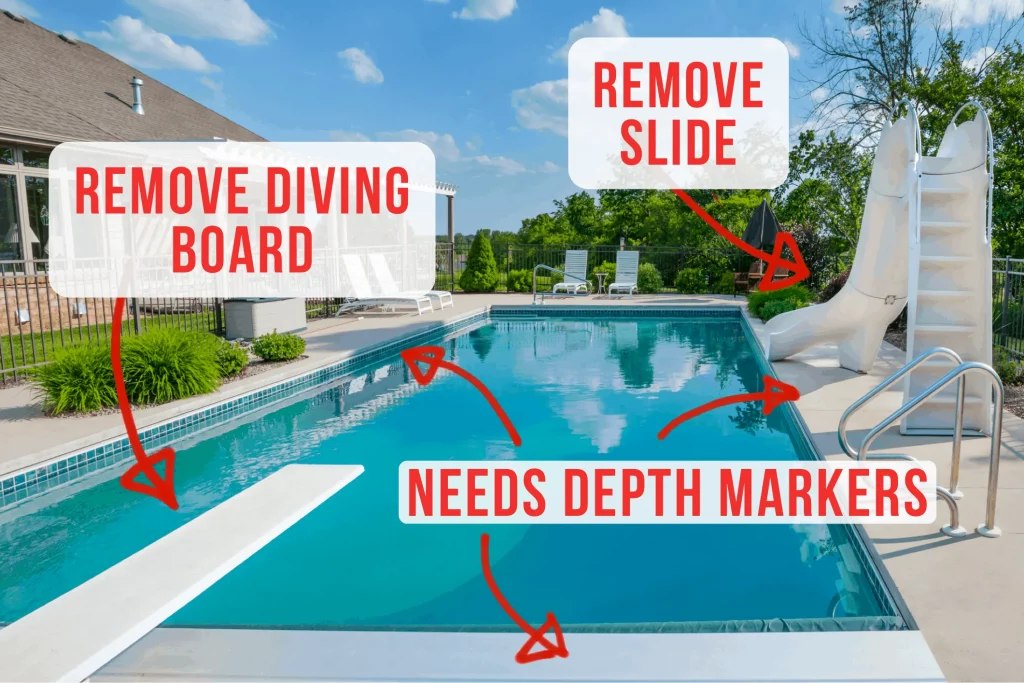Pool Safety Standards Every Vacation Rental Host Should Know
Offering an amenity like a pool can undoubtedly help your listing make a splash on platforms like Airbnb and VRBO when compared to other properties available in the area. But with this water amenity comes an increased responsibility to prioritize guest safety.
Before you invite your guests to dive in, you should understand the risks that amenities like pools, hot tubs, or lakefront properties bring to any short-term rental owner or host, as ensuring the safety of your guests should always be your top priority.
Neglecting to implement proper Airbnb pool safety measures can lead to devastating outcomes, from guest injuries to significant legal troubles. Understand the importance of short-term rental pool safety with these essential tips and insights to create a positively memorable stay for your visitors.

Your Responsibility to Ensure Guest Safety at Your Airbnb’s Pool
As the owner or host of a short-term rental property, you have a duty to prioritize the safety and well-being of your guests, especially when offering amenities like a pool. Providing an enjoyable experience or what you deem to be aesthetically pleasing should never come at the expense of compromising guests’ safety. Neglecting to implement proper Airbnb pool safety measures can lead to devastating outcomes, from guest injuries or fatalities to significant legal troubles.
If a guest gets injured (or worse), you may be found negligent, meaning that it happened because you didn’t take the appropriate safety precautions at your property. When it comes to lawsuits in the U.S., you can be sued for just about anything, and there are endless opportunities for accidents at short-term rental properties. This is where insurance comes in.
However, even insurance has its limitations, and if a guest can prove your negligence caused their injury, the more likely you are to exceed your insurance liability limits. The good news? The more you focus on pool safety in your short-term rental, the less opportunity for negligence on your part. If there were an injury, this effort could not only increase your insurance company’s chances of winning the case but may also greatly reduce the potential payout ordered by a judge.
Pool-Related Incidents & Risks of Pool Amenities
From an insurance perspective, claims due to injury at a pool are common, so anything you can do to reduce the risk of injury is a great place to start. More than 40 million adults can’t swim, according to the CDC, and the truth is, you simply don’t know who’s staying in your rental—and their ability to swim may vary greatly.
Airbnb Host FAQ: “Are Swimming Pools Really That Risky?”
Swimming pools were responsible for over 184,000 emergency room visits in 2022, with nearly half of pool injuries tied to swimming equipment like slides and diving boards, or apparel, according to a study by ValuePenguin. Slips, falls, and unsupervised children posed the greatest risks around pools, particularly for men and children under 10.
With 71% of fatal drowning incidents happening at residential properties (according to the U.S. Consumer Product Safety Commission), pool safety at your STR isn’t just important, it can be lifesaving.
When talking about swimming pool safety—and unfortunately, drowning statistics—it’s important to mention that the CDC notes drowning is the primary cause of death for children aged 1 to 4 and the second-leading cause of unintentional death for children aged 5-14. And it’s not just young children at risk of fatal drownings: adults over the age of 65 have the second-highest rate of drownings, a 19% increase from 2019 to 2022.
Short-term rental hosts can play a vital role in preventing pool-related tragedies when pool safety standards are taken seriously. From understanding the heightened risk of fatal drownings at residential properties to recognizing the vulnerable groups affected by drownings—from toddlers to seniors—the need for proactive water safety measures becomes abundantly clear. Simple changes, like removing hazards and implementing safety features, save lives and strengthens your reputation as a responsible host.
Lessen the Risk: Pool Safety Tips for Airbnb Hosts
Help protect your guests with preventative pool safety techniques. Removing hazards such as diving boards, slides, and non-certified floatation devices can greatly reduce the chance of an accident. Many listings neglect to address these issues because it’s not a platform requirement, or they don’t think they will get as many bookings without these features. Most simply don’t consider the additional risk.
Implement Pool Depth Markers
Just as public pools use depth markers, private rental pools should offer the same. Depth markers are a part of pool safety standards, designed to inform guests of water depth. With depth markers on all four sides of the pool, families and guests are forewarned and can judge their swimming abilities accordingly.
The Real Risks of Pools Without Depth Markers
A tragic incident involving 16-year-old Cameron Brown, who drowned in a Florida Airbnb pool, underscores the vital importance of transparency in pool safety. The subsequent lawsuit and $1.3 million settlement found both Airbnb and the Florida short-term rental owners negligent, identifying that the lack of a $100 pool safety line—intended to be placed exactly where Cameron went underwater—could have prevented this tragedy. Cameron’s family advocates for mandatory pool depth disclosures on platforms like Airbnb, as the lack of critical detail contributed to the tragedy.
By requiring owners to provide accurate, detailed information about pool depth, vacation rental platforms can contribute to a culture of transparency, responsibility, and, most importantly, guest safety. Cameron’s father, Marcus Brown, believes that knowing the pool’s depth would have changed their decision to enter the pool, preventing this heartbreaking outcome. Sharing safety information, even in online listings, is more than a responsibility; it’s a way to build trust and promote guest well-being.
Remove Pool Hazards to Reduce Liability
Diving boards and slides are fun features at city pools for children and adults, but there is a huge liability concern when it comes to offering these features at short-term rental properties.
Unlike city pools, there is no lifeguard on duty if someone is injured. It’s also difficult to know the abilities of your guests, and whether they understand how to use these items safely. This opens your business up to unnecessary legal risks in case of an injury. It’s important to hold your rental to pool safety standards, as many insurance providers may require you to remove your diving board and slide to diminish the liability concern and potential for negligence on your part.
Install Pool Safety Signage at your STR
Clearly posting warning signs can greatly reduce your negligence if a guest were to be injured at your pool. Displaying a “no diving” sign at the shallow end, along with signage mentioning “no lifeguard on duty” or “swim at your own risk,” are important safety reminders for your guests.
Superhost FAQ: “What if a Guest Gets Injured at My Airbnb’s Pool?”
If a guest is injured at your vacation rental’s pool, liability may arise if the injury is linked to negligence. In the case of an accident, your legal team through insurance will have a better chance at winning the case if the guest is found negligent instead of the host. That’s why Proper Insurance takes the time to identify and help you mitigate these risks and lessen negligence.
Maintain Easy Access to Water Rescue Equipment
Rescue equipment should also be a priority for your vacation rental guests and should mimic common pool safety requirements followed by hotels. When you visit a hotel pool, you’ll notice all types of warnings, waivers, and equipment in the water area. Rescue equipment, like a U.S. Coast Guard-approved pool ring or lifebuoy, is always stored on a surrounding wall or somewhere nearby. Hotels with pools utilize all precautions to make sure their guests stay safe—it should be no different for you as a short-term rental host, after all, short-term rentals also fall under hospitality law.
Since you don’t know the abilities of your guests, providing rescue equipment could help your guests stay safe and respond promptly if an accident were to occur. Placing an easily accessible, Coast Guard-certified life ring near your vacation rental’s pool can also help your insurance carrier battle a lawsuit if your guest were to be injured.
Use Caution with Pool Toys and Floats
Providing pool toys and floats to your guests could increase your liability exposure. Why are pool floats a risk when offered to guests? Pool floaties may provide weak swimmers, as well as parents or guardians, with a false sense of safety, resulting in less poolside supervision. Having too many floaties or pool toys may also pose visibility risks, preventing a clear view of the bottom of the pool.
By including inflatables or pool floaties with your rental, you are inadvertently encouraging those who may not be the best swimmers to go for a dip, or parents to keep a less watchful eye, which could ultimately result in drowning. If guests leave behind inflatable toys or pool floats, toss them away like you would leftover liquor to lessen your liability risk.
Some flotation devices, like many life vests, are certified by the U.S. Coast Guard (USCG) and come with proper use instructions. Your insurance company may advise that you only provide USCG-rated devices for safety surety. Life preservers that are not Coast Guard-certified are simply buoyant material that may pop or fail to support a floating guest—it’s best to keep these away from your rental.

Gain Peace of Mind Through Proper Underwriting
Adequate safety standards for pools (depth markers, rescue equipment, no diving board, etc.) are an underwriting requirement of many insurance carriers because they are a ‘known risk,’ meaning they’ve seen a high number of lawsuits involving these items in the past.
Underwriters may ask that you make changes to your property such as adding depth markers on all four sides of your pool in order to continue the insurance contract. While this requirement may seem like a barrier to entry, there is typically a grace period in which the underwriters will notify you of potential risks and give you an opportunity to correct the issue without a gap in coverage.
However, if there were an injury at your property, your robust liability insurance would respond.
Choosing a carrier with underwriters experienced with short-term rentals can be a huge help as they will review your property for potential risks. They’ve seen thousands of listings and hundreds of lawsuits, making it easy for them to identify issues before an accident.
Ultimately, when accidents happen, you call your insurance carrier. If your property is underwritten properly and insured appropriately according to its use as a short-term rental, you’ll have liability coverage. For this reason, it’s important to be open with your insurance carrier and ensure safety measures are appropriate for commercial use, not only your personal use.
Renting Out Your Pool? There’s More to Consider Than Towels
Many standard policies exclude liability when the pool is rented without the home. That’s why Swimply recommends Proper Insurance for those renting out their pool.
Our tailored policy can help cover the risks that come with pool rentals—like slip-and-falls, injuries, and lawsuits—whether you rent out the whole property or just the pool.
Quote Your Short-Term Vacation Rental Today
Proper Insurance is the nation’s leading short-term vacation rental insurance provider, with the most comprehensive policy on the market. We protect homes in all 50 states and D.C. with unmatched coverage for your property, revenue, and business liability, customized to include guest-caused theft/damage, liquor liability, amenity liability (bikes, kayaks, hot tub, etc.), bed bugs, squatters, and more.
Proper’s policy covers vacation homes, townhouses, condos, duplexes, cabins, cottages, apartments, and more. With expert vacation rental underwriters, we can tailor a policy specific to your short-term rental property. Backed by Lloyd’s of London and exclusive endorsements from vacation rental leaders such as Vrbo, Proper Insurance is built on world-class insurance coverage.


